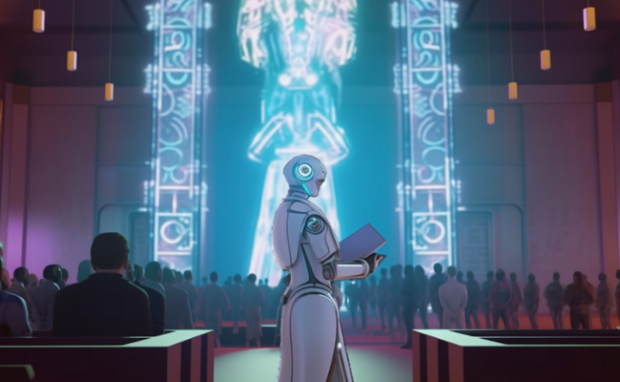On June 9, 2023, over 300 people attended a unique ChatGPT-powered church service at St. Paul’s Church in Fürth, Germany. The Associated Press says it involved a 40-minute sermon using AI-generated sermons delivered by digital avatars on a TV screen above the altar. Consequently, it drew mixed reactions from priests and churchgoers.
Artificial intelligence’s impact is so significant that it has seeped into philosophy and ethics. As we integrate this technology into more parts of our lives, we must ponder on its presence in religions. More importantly, this issue shows how millennia-old institutions adapt to our increasingly digitalized world.
Religions are a significant part of society, so their changes impact your life, regardless of your affiliation. This article will discuss how priests created a sermon with the AI program. Later, I will cover how people reacted to the unusual experiment.
How did priests create the AI-generated sermon?

Photo Credit: decrypt.co
Jonas Simmerlein, a theologian and philosopher from the University of Vienna, created this unique church experience. The 29-year-old scholar told The Associated Press, “I conceived this service, but actually, I rather accompanied it because I would say about 98% comes from the machine.”
He used it in the Deutscher Evangelischer Kirchentag or “Protestants in Germany,” a biennial event occurring in different places in the country. It draws thousands of believers to sing, pray, and discuss their faith.
They also ponder ongoing events like the Ukraine-Russia war, global warming, and artificial intelligence. This year’s congregation had the motto, “Now is the time,” one of the prompts Simmerlein submitted to ChatGPT.
“I told the artificial intelligence, ‘We are at the church congress, you are a preacher … what would a church service look like?’,” he explained to AP News. “You end up with a pretty solid church service.”
The news outlet noted how the religious leader sounded almost surprised by the success of his experiment. Four on-screen avatars, two young women and two young men, led the AI church service.
The believers listened attentively as a robotic voice preached about “leaving the past behind, focusing on the challenges of the present, overcoming fear of death, and never losing trust in Jesus Christ.” Meanwhile, the churchgoers enthusiastically recorded videos of the event on their smartphones.
The digital preacher inadvertently drew laughter as it shared platitudes. It also told the attendees with a deadpan expression in order “to keep our faith, we must pray and go to church regularly.”
Simmerlein said he did not intend to replace religious leaders with artificial intelligence. Instead, he believes AI can help him and his colleagues perform their daily duties.
How did people react to the AI church service?
Action-packed day in AI:
• AI-powered church
• U.N. backs AI advisory board
• Salesforce launches AI Cloud
• Meta open-sources music generator
• UK Gov. granted access to AI models
• Plus, 9 new tools and resourcesHere’s the rundown on everything you need to know:
— The Rundown AI (@TheRundownAI) June 12, 2023
A church in Germany drew a 300+ person crowd to a service ran entirely by AI.
The 40-minute sermon featured text generated by OpenAI’s ChatGPT and was delivered by AI avatars on a television screen above the altar. pic.twitter.com/RJqai86wXY
— The Rundown AI (@TheRundownAI) June 12, 2023
He told The Associated Press some pastors seek inspiration from literature. Hence, why shouldn’t they ask this technology for ideas regarding an upcoming sermon?
“Artificial intelligence will increasingly take over our lives, in all its facets,” Simmerlein said. “And that’s why it’s useful to learn to deal with it.”
Yet, he understands the limitations of this technology. “The pastor is in the congregation, she lives with them, she buries the people, she knows them from the beginning,” Simmerlein said. “Artificial intelligence cannot do that. It does not know the congregation.”
A 31-year-old Lutheran pastor, Marc Jansen, was also positive about the AI church service, according to Ars Technica. “I had actually imagined it to be worse. But I was positively surprised by how well it worked. Also, the language of the AI worked well, even though it was still a bit bumpy at times,” said Jansen.
However, the experiment frustrated and worried churchgoers, according to the sports website Sportskeeda. For example, it shared a tweet from Joris de Jong which states:
“An AI chatbot delivers a sermon to a packed German church, telling congregants not to fear death. Is this the future of religion?” Also, Twitter user TLKletz said, “People are worshipping AI. WE ARE AT END OF TIMES.”
Conclusion
A German church held a congregation led by an AI-generated sermon. Its creator, theologian Jonas Simmerlein, emphasized he does not intend to replace religious leaders with artificial intelligence.
On the other hand, many churchgoers felt horrified about this unusual experiment. Heiderose Schmidt, a 54-year-old IT worker, said, “There was no heart and soul.”
Rabbi Joshua Franklin responded similarly to the AI-enabled sermon at a US synagogue in January 2023. Learn more about artificial intelligence and other digital trends at Inquirer Tech.
READ MORE:
2021 Transformation Summit to highlight new tech as ‘Next-Level Play’ for industry
